Related Research Articles
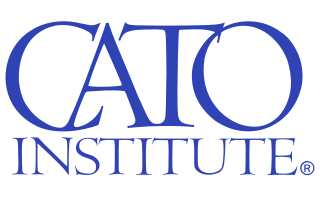
The Cato Institute is an American libertarian think tank headquartered in Washington, D.C. It was founded as the Charles Koch Foundation in 1974 by Ed Crane, Murray Rothbard, and Charles Koch, chairman of the board and chief executive officer of Koch Industries. In July 1976, the name was changed to the Cato Institute. Cato was established to have a focus on public advocacy, media exposure and societal influence. According to the 2017 Global Go To Think Tank Index Report, Cato is number 15 in the "Top Think Tanks Worldwide" and number 10 in the "Top Think Tanks in the United States".

Ronald Ernest Paul is an American author, physician, and retired politician who served as the U.S. Representative for Texas's 22nd congressional district from 1976 to 1977 and again from 1979 to 1985, and then for Texas's 14th congressional district from 1997 to 2013. On three occasions, he sought the presidency of the United States: as the Libertarian Party nominee in 1988 and as a candidate for the Republican Party in 2008 and 2012. A self-described constitutionalist, Paul is a critic of the federal government's fiscal policies, especially the existence of the Federal Reserve and the tax policy, as well as the military–industrial complex, the war on drugs, and the war on terror. He has also been a vocal critic of mass surveillance policies such as the USA PATRIOT Act and the NSA surveillance programs. He was the first chairman of the conservative PAC Citizens for a Sound Economy, a free-market group focused on limited government, and has been characterized as the "intellectual godfather" of the Tea Party movement, a fiscally conservative political movement that is largely against most matters of interventionism.

Gary Earl Johnson is an American businessman, author, and politician. He was the 29th governor of New Mexico from 1995 to 2003 as a member of the Republican Party. He was the Libertarian Party nominee for President of the United States in the 2012 and 2016 elections. He was also the Libertarian nominee in the 2018 U.S. Senate election in New Mexico.
Paleolibertarianism was a right-wing populist strategy of political communication of libertarianism developed by American anarcho-capitalist theorists Murray Rothbard and Lew Rockwell in the American political context after the end of Cold War, from 1989 to 1995, that sought to deliver the libertarian ideas of opposition to government intervention to working and middle-class people of the time, using friendly messages with their common cultural norms. With these methods it was expected to reconnect the modern libertarian movement with its historical anti-socialist, anti-war and popular roots found in the American classical liberal movement of the first half of the 20th century that was part of the anti–New Deal Old Right. It sought to move libertarian movement away from the influence of public policy libertarian organizations based in Washington, D.C., who were accused of giving up communicating the complete libertarian message while adopting the political and cultural values of the U.S. capital to gain acceptance among the political elite; and to move the American right-wing politics away from neoconservative movement who was accused for continue the U.S. government imperialist policies of Cold War era into post–Cold War era.

Edward E. Clark is an American lawyer and politician who ran for Governor of California in 1978, and for President of the United States as the nominee of the Libertarian Party in the 1980 presidential election.
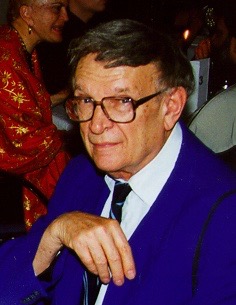
John Hospers was an American philosopher and political activist. Hospers was interested in Objectivism, and was once a friend of the philosopher Ayn Rand, though she later broke with him. In 1972, Hospers became the first presidential candidate of the Libertarian Party, and was the only minor party candidate to receive an electoral vote in that year's U.S. presidential election.

David Boaz is the executive vice president of the Cato Institute, an American libertarian think tank.
In American politics, a libertarian Republican is a politician or Republican Party member who has advocated libertarian policies while typically voting for and being involved with the Republican Party.

Ayn Rand's philosophy of Objectivism has been and continues to be a major influence on the right-libertarian movement, particularly libertarianism in the United States. Many right-libertarians justify their political views using aspects of Objectivism.

John A. Allison IV is an American businessman and the former CEO and president of the Cato Institute in Washington, D.C.. Allison held a number of leadership positions in BB&T Corp. from 1987 until 2010 when he retired. He now serves as a director at Moelis & Company.
Libertarianism in the United States is a political philosophy and movement promoting individual liberty. According to common meanings of conservatism and liberalism in the United States, libertarianism has been described as conservative on economic issues and liberal on personal freedom, often associated with a foreign policy of non-interventionism. Broadly, there are four principal traditions within libertarianism, namely the libertarianism that developed in the mid-20th century out of the revival tradition of classical liberalism in the United States after liberalism associated to the New Deal; the libertarianism developed in the 1950s by anarcho-capitalist author Murray Rothbard, who based it on the anti-New Deal Old Right and 19th-century libertarianism and American individualist anarchists such as Benjamin Tucker and Lysander Spooner while rejecting the labor theory of value in favor of Austrian School economics and the subjective theory of value; the libertarianism developed in the 1970s by Robert Nozick and founded in American and European classical liberal traditions; and the libertarianism associated to the Libertarian Party which was founded in 1971, including politicians such as David Nolan and Ron Paul.
In American politics, a libertarian Democrat is a member of the Democratic Party with political views that are relatively libertarian compared to the views of the national party.
The political activities of the Koch brothers include the financial and political influence of Charles G. and David H. Koch (1940–2019) on United States politics. This influence is seen both directly and indirectly via various political and public policy organizations that were supported by the Koch brothers.
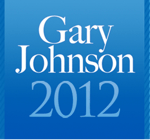
The 2012 presidential campaign of Gary Johnson, the 29th Governor of New Mexico, was announced on April 21, 2011. He declared his candidacy for the 2012 Republican Party nomination for President of the United States. On December 28, 2011, Johnson withdrew his candidacy for the Republican nomination, and declared his candidacy for the 2012 presidential nomination of the Libertarian Party. The 2012 Libertarian National Convention was held during the first weekend of May 2012. On May 5, 2012, after promoting his libertarian-oriented political positions to delegates, Johnson received the most votes at the convention and became the official 2012 Libertarian presidential nominee. On November 6, 2012, Johnson received just under 1% of the popular vote in the general election, amounting to more than 1.2 million votes, more than double what the Barr/Root ticket received in 2008. This was the most successful result for a third-party presidential candidacy since 2000, and the best in the Libertarian Party's history by vote number at the time. Johnson ran again in 2016 and received nearly four times his 2012 vote total.
Kevin Gentry is a conservative political activist and fundraiser who serves as vice president of the Charles G. Koch Charitable Foundation. A top aide to Charles Koch and David H. Koch, Gentry serves as vice president of special projects at Koch Industries.
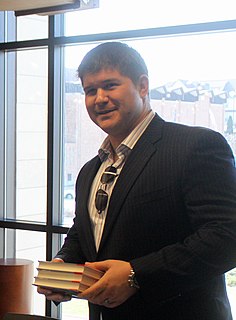
Jesse Reeves Benton is an American conservative political operative, writer, entrepreneur, and convicted felon. Benton is closely associated with the Paul family. He served as a campaign manager for both Ron Paul and Rand Paul. He is married to Valori Pyeatt, Ron Paul's granddaughter.
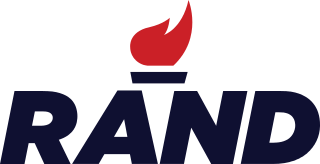
The 2016 presidential campaign of Rand Paul, the junior United States Senator from Kentucky, was announced on April 7, 2015 at an event at the Galt House in Louisville, Kentucky. First elected to the U.S. Senate in the 2010 election, Paul's candidacy for the Republican nomination for President of the United States in 2016 had been widely speculated since early 2013.

The 2016 United States Senate election in Kentucky was held November 8, 2016 to elect a member of the United States Senate to represent the State of Kentucky, concurrently with the 2016 U.S. presidential election, as well as other elections to the United States Senate in other states and elections to the United States House of Representatives and various state and local elections. The primaries were held May 17.

The 2016 presidential campaign of Gary Johnson, the 29th Governor of New Mexico, was announced on January 6, 2016, for the nomination of the Libertarian Party for President of the United States. He officially won the nomination on May 29, 2016, at the Libertarian National Convention in Orlando, Florida, receiving 56% of the vote on the second ballot. Former Massachusetts Governor William Weld was endorsed by Johnson for the Libertarian vice-presidential nomination, which he also received on May 29, 2016.
References
- ↑ "Cato Institute Welcomes New CEO, Announces Changes to Board". Cato Institute.
- ↑ Weigel, David (25 June 2012). "Ed Crane steps down to end the Koch brothers' attempted coup at Cato, and libertarians cheer". Slate.com. Retrieved 15 November 2016.
- ↑ Morin, Richard (May 9, 2002). "Free Radical; Libertarian—and Contrarian—Ed Crane Has Run the Cato Institute for 25 Years. His Way". Washington Post. Retrieved December 10, 2012.
- ↑ Jackovich, Karen G. (September 22, 1980). "Ed Clark Is the Libertarian Party's Headstrong Candidate for the White House". People. Retrieved December 10, 2012.
- ↑ Staff Editorial (October 23, 2012). "Ed Crane's Freedom Legacy". Wall Street Journal. Retrieved December 10, 2012.
- ↑ Weigel, David (March 22, 2012). ""Who the Hell is Going to Take a Think Tank Seriously If It's Controlled by Billionaire Oil Guys?" Cato's President Speaks". Slate. Retrieved December 10, 2012.
- ↑ Meyer, Jane (27 June 2012). "The Kochs v. Cato: Winners and Losers". The New Yorker. Retrieved 6 July 2020.
- ↑ Vogel, Kenneth P. (June 26, 1980). "Cato, Koch brothers settle ownership fight". Politico. Retrieved December 10, 2012.
- ↑ http://purplepac.org/about/ [ dead link ]
- ↑ "Politico Slanders Ed Crane, a Great Man". The Heartland Institute. Retrieved 2020-07-01.
- ↑ Morin, Richard (May 9, 2002) "Free Radical; Libertarian — and Contrarian — Ed Crane Has Run the Cato Institute for 25 Years. His Way.", Cato.org
- ↑ Crane, Edward H. (December 31, 2011) "Why Ron Paul matters", Cato.org
- ↑ "Politico Overstates His Dropping Out, Insists Rand Paul-Supporting SuperPAC Chief Edward Crane". September 29, 2015.
- ↑ Weigel, David (September 29, 2015) "Pro-Rand Paul PAC isn’t shutting down, just asking Paul to be more libertarian", The Washington Post